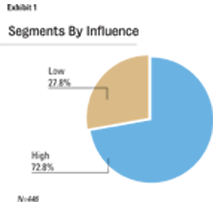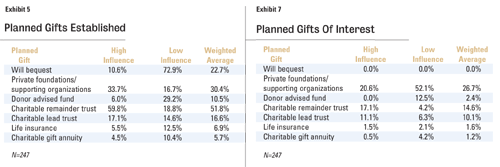About half of the 247 wealthy individuals that have established planned gifts have additional planned giving needs. A much larger percentage of high-influence givers, 58 percent, expect to enhance their existing gifts or established additional gifts as compared to just 19% of the low-influence givers (Exhibit 6).
While high-influence givers cited the same gifting vehicles-private foundations, charitable remainder trusts and charitable lead trusts-they are already using, their low-influence counterparts expressed an interest in exploring other options moving forward. The vehicle of greatest interest to the low-influence group was a private foundation, as cited by 52% of the segment. After that, interest in other giving structures dropped off considerably with just 13% identifying the donor advised fund as a product of interest (Exhibit 7).
Charitable giving continues to hold significant appeal for the wealthy, but the degree to which each giver is involved in the process varies widely based on their personal level of interest. The planned giving process can help all types of donors get the maximum benefit from their gifts as it provides a forum to have a dialogue with selected charities, creates opportunities to involve family members, and can ensure tax codes are interpreted and leveraged to the greatest degree possible. Still, many affluent givers continue to make contributions without any advance planning and, as a result, may be sacrificing some substantial benefits.











